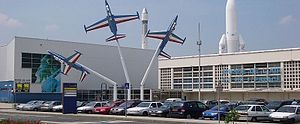
The Musée de l'air et de l'espace, (English: Air and Space Museum), is a French aerospace museum, located at the south-eastern edge of Le Bourget Airport, north of Paris, and in the commune of Le Bourget. It was inaugurated in 1919 after a proposal by the celebrated aeronautics engineer Albert Caquot (1881–1976).
Occupying over 150,000 square metres (1,600,000 sq ft) of land and hangars, it is one of the oldest aviation museums in the world. The museum's collection contains more than 19,595 items, including 150 aircraft, and material from as far back as the 16th Century. Also displayed are more modern air and spacecraft, including the prototype for Concorde, and Swiss and Soviet rockets. The museum also has the only known remaining piece — the jettisoned main landing gear — of the L'Oiseau Blanc (The White Bird), the 1927 aircraft which attempted to make the first Transatlantic crossing from Paris to New York. On 8 May 1927, the aircraft took off from Le Bourget, jettisoned its main landing gear (which is stored at the museum), which it was designed to do as part of its trans-Atlantic flight profile, but then disappeared over the Atlantic, only two weeks before Lindbergh's monoplane completed its successful non-stop trans-Atlantic flight to Le Bourget from the United States.